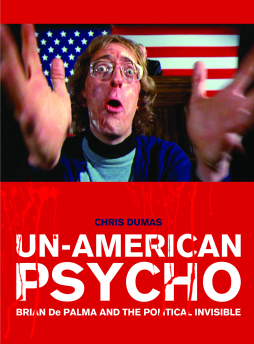
Additional Information
Book Details
Abstract
Brian De Palma is perhaps best known as the director behind the gangster classic Scarface. Yet as ingrained as Scarface is in American popular culture, it is but one of a sizable number of controversial films—many of which are consistently misread or ignored—directed by De Palma over his more than four-decade career. In Un-American Psycho, Chris Dumas places De Palma’s body of work in dialogue with the works of other provocative filmmakers, including Alfred Hitchcock, Jean-Luc Godard, and Francis Ford Coppola with the aim of providing a broader understanding of the narrative, stylistic, and political gestures that characterize De Palma’s filmmaking. De Palma’s films engage with a wide range of issues surrounding American political and social culture, and this volume offers a rethinking of the received wisdom on his work.
How, at this date, can you possibly write an original book on Alfred Hitchcock? Or on his fellow sovereign of
Film Studies, Jean-Luc Godard? Or, for that matter, on anything in Film Studies, a discipline whose present
practitioners seem to drive the same luxe brands of theory along the same political/aesthetic autoroutes? To
these riddles, Chris Dumas gives us a surprising but cogent answer: by writing an outrageously original book
on Brian De Palma, the figure whom this same discipline has—with suspicious but never before interrogated
vehemence—dismissed as Hitchcock’s evil emulator and Godard’s dumb double. De Palma, who in Dumas
finally finds a critic and theorist worthy of him, has undoubtedly been waiting a long time for this book. But so
has Film Studies. In a field deeply fearful of being cast out from scholarly legitimacy, of bearing the same stigma
that it has inflicted on De Palma, Un-American Psycho can’t but register as remarkably fresh work in every
main sense: unusual, invigorating, cheeky. But try to imagine all that a character in Psycho might have had in
mind when he complained that the air was “hot as fresh milk,” and you’ll be alerted to a rarer and possibly more
troubling sort of freshness on offer here. This is, to give it a name, the raw thrill of live writing.
D.A. Miller, author of Jane Austen, or The Secret of Style
Chris Dumas holds degrees from Oberlin College, Columbia University, and Indiana University. Born in Arkansas, he lives in San Francisco.
Table of Contents
| Section Title | Page | Action | Price |
|---|---|---|---|
| Cover | Cover | ||
| Title\r | 1 | ||
| Half Title\r | 3 | ||
| Copyright\r | 4 | ||
| Dedication Page\r | 5 | ||
| Table of Contents\r | 7 | ||
| List of Illustrations | 9 | ||
| Acknowledgments | 11 | ||
| Introduction The Case of the Missing Disciplinary ObjectINCT_ | 15 | ||
| Chapter 1 Shower Scene | 33 | ||
| Hitchcock and the Murder of Marion Crane | 40 | ||
| How to Blame De Palma | 47 | ||
| How to Operate the Hitchcock Machine | 61 | ||
| Everything You Ever Wanted to Know about Žižek (But Were Afraid to Ask De Palma) | 85 | ||
| Chapter 2 Get to Know Your Failure | 97 | ||
| Death(s) of the Left: An Historical Cartoon | 104 | ||
| Godard: The Holy Man | 112 | ||
| Made in U.S.A. | 122 | ||
| Cinema of Failed Revolt | 142 | ||
| Chapter 3 The Personal and The Political | 159 | ||
| Bad Objects | 161 | ||
| The Liberal Gaze | 179 | ||
| The Political Invisible | 192 | ||
| Conclusion Norman Bates and His Doubles | 217 | ||
| Reference List and Bibliography | 231 | ||
| Index of Film Titles and Selected Proper Names | 243 | ||
| Back Cover | Back Cover |
